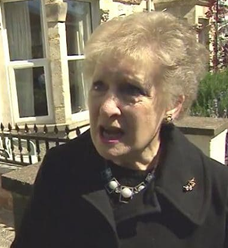When Push Comes to Nudge
Nudge Theory: it's all part of a cunning Baldrick type plan to persuade you to live more healthily, on the grounds that healthy people are happier and will make a more positive contribution to the Big Society.
The Agenda
‘Today we can’t escape the fact that many of our most severe health problems are caused, in part, by the wrong personal choices. Obesity, binge-drinking, smoking and drug addiction are putting millions of lives at risk and costing our health services billions a year. So getting to grips with them requires an altogether different approach to the one we have seen before. We need to promote more responsible behaviour and encourage people to make the right choices about what they eat, drink and do in their leisure time.’ (David Cameron, foreword, A Healthier Nation, Policy Green Paper No.12, Conservative Party.)
Here we see our one time Prime Minister taking time out in his busy life, i.e., dining with his chums up in Chipping Norton, to consider how we spend our leisure time.
UP
Behavioural Insights Abound
This outrage was designed by Cameron's Behavioural Insight Team, otherwise known as the Nudge Unit. That is a group of people being paid to think up ways to persuade us "to make better choices for ourselves".
The inspiration behind the Unit, which was central to Dave's Big Society plans, is behavioural economics expert Dr David Halpern. The Unit's focus is on all the problems associated with unhealthy life-styles.
Halpern is no stranger to the Cabinet Office, he was one of Blair's glove puppets under the last regime. His most famous contribution at that time towards a Nudge Theory was the paper 'Personal Responsibility and Behaviour Change'. However, more recently, a 2008 book called Nudge: Improving Decisions About Health, Wealth and Happiness, by Richard Thaler and Cass Sunstein sets out the full picture. (P.S. Sunstein worked for Obama and Thaler works in the Nudge Unit). The book explores "libertarian paternalism", or how public and private organisations can help people make better choices through market incentives.
In practice this will mean giving poor people food vouchers that can only be used on healthy choices. In New York, this thinking inspired one time Mayor Bloomberg to try to stop poor people spending their welfare vouchers on soda pop.
It get's worse.....
Halpern said in his blog that his work will build on the Mindspace report commissioned by the previous government. Mindspace looked at ways of changing people's behaviour by influencing not just what they consciously think but also by influencing their "automatic processes" – cues from the subconscious, from the behaviour of people around them, and from emotional associations that affect their decisions.
For year's we have grown used to advertisers' tricks, now the Government is doing it as well. Even the Department of Health has set up a 'Behaviour Change Unit', informed by ad-men.
George Osborne told us: "Our work with the world's leading behavioural economists and social psychologists is yet more proof that the Conservative party is now the party of ideas in British politics."
People are, apparently, powerfully influenced by the people around them, this insight is one of the driving forces behind Nudge Theory for policy makers. The basic idea for policy makers is simple, tell people what the norms are and people will fall into line with those norms. Evidence from America suggests that a simple metaphorical pat on the back, like a smiley face on your energy bill, does the trick.


 .
.